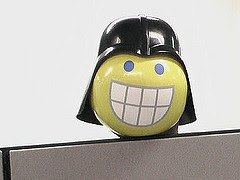
While drinking my morning coffee and checking on my blog subscriptions, I scrolled over a title called "Embracing Wikipedia" by Larry ferlazzo, which had a link to an Article by the same name by Matthew Shapiro in Education Week.
My natural inclination was to quickly delete any such harrasy, thus preventing the words from making my eyes bleed and accidentally landing me in one of the outer rings of Doom, the one reserved for people with poor researching skills. But then I realized the importance of opening your eyes to opinions you disagree with, and even opinions you hate. The world moves far too quickly to hold grudges on ideas, and no one wants to be the teacher who still uses the same binder of worksheets she acquired in 1970.
I recommend reading the post and coming up with your own ideas on the opinions stated. I for one found it to be very interesting and worth considering in the classroom. He mentioned the scrutiny entries go through to be used, the panels and discussions, and the citations at the bottom. The latter piece is what helped me see his side a bit more, but I suppose that is because at my core, I still don't trust a website that once said Caesar fought off his enemies with an ipod, or that had information one week that gave a list of animals vegetarians can eat (what???) and the next week said that vegetarians did not eat animals etc. etc. etc. for several months.
The author seems to feel that he can trust the Wikipedia information as well has he trusts the Encyclopedia. I don't think I will be able to jump on that boat just yet, but maybe Wikipedia, much like "The Force" is a power that can be used for both good and evil. Maybe I have only seen the evil.
I think if I were to use it in my class, it would only be after we learned how to decipher between credible websites and websites that might be trying to lead them astray, much like how students have to fully understand how to write complete sentences before they can figure out how to thoughtfully write using sentence fragments.
Anyway, this was my response to the article that I left on his post, but I wanted to think and ramble on the topic of Wikipedia further on here.
Very interesting article. It brings up some very valid points, and I for one abhor Wikipedia. Sure, I like it to answer some quick questions here and there, but I do not see it as a valid source for research.
My worry is that Wikipedia takes us farther and farther away from recognizing “credible” sources. Eventually we get to (and have gotten to) a point in which we believe any random “fact” or “statistic” people say to us. Our next-door neighbor, who may not be an expert in anything is suddenly a source for a statistic on how 80% of schools waste all their tax money on teacher vacations.
I have a facebook, and several times a week friends and family members are posting made up statistics about various causes because we no longer recognize what is credible or how to find the information for ourselves.
That said, this article gave me some definite food for thought. I wish it would have addressed that our research sources are not quite as limited as Wikipedia or a dusty-ole book. :) I feel it is important to teach students how to spot credible websites, and perhaps that can be done through Wikipedia as well by using all the links provided. Thanks for the eye-opening article!
photo http://www.flickr.com/photos/misterwilson/84860632/
http://creativecommons.org/licenses/by/2.0/deed.en
You make a good point about being sure that students know how and do check the credibility of websites they use, including Wikipedia. Question: if a student uses an Encyclopedia Britannica article for some information, would we be as diligent to be sure that the credibility of the website was checked? Of course, I would not expect high school students to use encyclopedia articles--online or offline--as major sources of information for their research, but do we teach them that ANY encyclopedia has errors?
ReplyDeleteOne article I read (sorry... can't locate it at the moment) said that the more discussion the Wikipedia folks had about specific articles, the more accurate those articles became. Seems like that's a good lesson for our students about revision and continued research.
After reading your article (and Larry Ferlazzo's and the one in Education Week, also) I checked to see if there was any recent research about Wikipedia's accuracy. (I thought a 2005 article was a bit old as a technology article.) There appears to be a bit, but not much... and the sample sizes are not particularly large. However, the newer articles at this point do not appear to indicate any lesser degree of accuracy for Wikipedia.
I think my advice to students will remain the same for now... Wikipedia's a good place to start, but as with any encyclopedia, you don't want to stop there.
Thanks for sharing an interesting article and your response to it. It certainly was thought-provoking at this early hour!